4th HPP-NL Workshop
Starting last year, the History and Philosophy of Physics community in the Netherlands (HPP-NL) decided to organise regular HPP-NL afternoon workshops, roughly twice a year, in varying cities. The 4th HPP-NL Workshop will take place in Nijmegen on the afternoon of Friday, 4 October 2024. This workshop will feature an international keynote by Alyssa Ney (LMU Munich) as well as talks by NL-based historians and philosophers of physics.

Registration is closed now.
Here is a PDF with the programme to download.
When: Friday, 4 October 2024
Where: Erasmus building E15.39/41 (Erasmusplein 1, 6525HT Nijmegen)
Directions: Busses 10 or 15 from Nijmegen Centraal or Heyendaal to Erasmusgebouw
Programme
12:30 - 13:00 Coffee/tea
13:00 - 13:45 Karla Weingarten
13:45 - 14:30
14:30 - 15:00 Coffee/tea
15:00 - 15:45 Fedde Benedictus
15:45 - 16:30 Simon Friederich
16:30 - 17:00 Coffee/tea
17:00 - 18:15 Alyssa Ney
19:00 Dinner
Abstracts (chronologically)
Karla Weingarten (Nijmegen): Representing and Understanding with Feynman Diagrams
Feynman diagrams are a ubiquitous method in QFT to derive terms in a perturbation series that approximates a scattering amplitude. But a development from mere calculation tools to independent representations of particle phenomena is visible. This is in opposition to the received view of Feynman diagrams that denies the possibility of representation, an argumentation that stems from the diagrams’ intricate connection to perturbation theory. In this talk, I argue that physicists do not use the diagrams in the way philosophy accuses them of. Physicists, using Feynman diagrams in a detached manner, are not concerned with perturbation theory but rather aim to gain epistemic access to the particle interaction. To accommodate this practice, I argue that we can consider Feynman diagrams as models, representative of a particle interaction because they provide model understanding of it.
Simon Friederich (Groningen): Quantization as the root of the measurement problem – and as the key to its solution
I propose a new perspective on quantization, centred around the idea that “not giving rise to a measurement problem” can be turned into a fruitful criterion for the choice of quantization scheme. Notably, I suggest to combine assuming that a quantum system has a sharp phase space location, and thereby avoiding the measurement problem, with regarding its classical dynamical variables as the correct ones. The self-adjoint Hilbert space operators assigned to these by quantization merely “represent” them, for the purposes of calculation. An immediate attraction of this idea is that it makes the Kochen-Specker theorem obsolete because quantization, in general, does not leave algebraic relations invariant, thereby undermining the intuitive appeal of Kochen-Specker non-contextuality.
Concretely, the idea that a quantization scheme Q: A→Â should not give rise to a measurement problem can be encoded in the criterion that, for any (“classical”) dynamical variable A, its quantum expectation value Tr(ρ Â) should be interpretable as a weighted phase space integral of the “classical” A, with a suitable probability distribution P. It turns out that, in ordinary quantum mechanics, such an interpretation is viable for Anti-Wick quantization. Here the role of the phase space probability distribution P on phase space is played by the Husimi-function Q. Anti-Wick quantization can be seen as a special case of two more widely generalizable approaches to quantization: “Berezin-Toeplitz quantization” and “coherent state quantization.” I conclude that investigating the applicability and empirical viability of these approaches is a promising avenue for turning “solving the measurement problem” into a criterion that may stimulate future progress in physics.
Fedde Benedictus (Utrecht): Quantum Theory Is Not As Strange As We Think (or is classical physics stranger than we think?)
The aim of this talk is to show that the phenomena which set the theory of quantum mechanics apart from classical (Newtonian) physics are already present, in some form or other, in Newton’s physics. As a result of this, quantum effects are either 1) not as unintelligible as they are often held to be, or 2) their classical counterparts are more difficult to understand than is usually argued.
Cancelled: Luca Forgiarini (Utrecht): CERN’s relations with Poland, 1950s-1970s
Founded in 1954, the European Organisation for Nuclear Research, commonly known as CERN, was the first intergovernmental scientific organisation of its kind. Although its membership was exclusively Western-European, during the Cold War years, CERN also regularly collaborated with groups on the other side of the Iron Curtain. In this presentation, I trace the development of CERN’s collaboration with Poland and Polish scientists from the late 1950s to the early 1970s and argue that, despite the political tensions of the Cold War, Polish high-energy physics groups were integrated into the CERN system in a manner similar or even equivalent to that of groups from CERN’s member states.
Alyssa Ney (Munich): Is the Universe Fundamentally a Density Matrix?
This paper examines the case for density matrix realism, as an approach to the fundamental ontology of our world. To date, there are two arguments that have been used to motivate density matrix realism. One is that we get a simpler metaphysics if we move from wave function realism to density matrix realism. The second is that density matrices are more general than wave functions, in allowing that the universe could be in a mixed state. To be convincing, these arguments can’t rest on the logical possibility that our universe could be in a mixed state. After all, if we assume standard understandings of mixedness, it’s a contradiction to say that the universe as a whole could (objectively) be in a mixed state. Thus, one would need to appeal to some scientifically-backed argument that the Quinean web of belief needs revision. Here, Hawking’s model of black hole evaporation seems poised to come to the rescue, and so we develop an argument to this effect. Although we find the prospect of using black hole evaporation to argue for density matrix realism to be intriguing and worthy of investigation, we show that there is substantial reason to be cautious. Most physicists, including Hawking, believe that this model will be superseded by a more fundamental theory of quantum gravity. Despite the lack of consensus on the details of such a theory, the guiding principles that do enjoy some consensus point away from an interpretation of black hole evaporation in which the universe as a whole evolves into an (objectively) mixed state. We conclude that there do not seem to be compelling motivations coming from the most sophisticated candidates for fundamental physics to entertain situations in which the universe is characterized by a density matrix rather than by a wave function or state vector.

